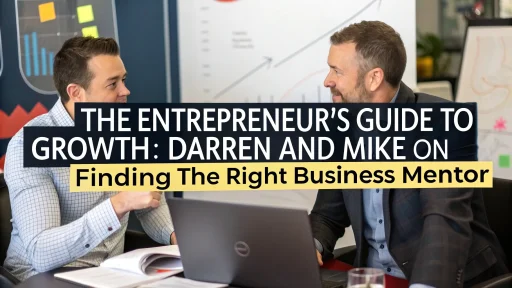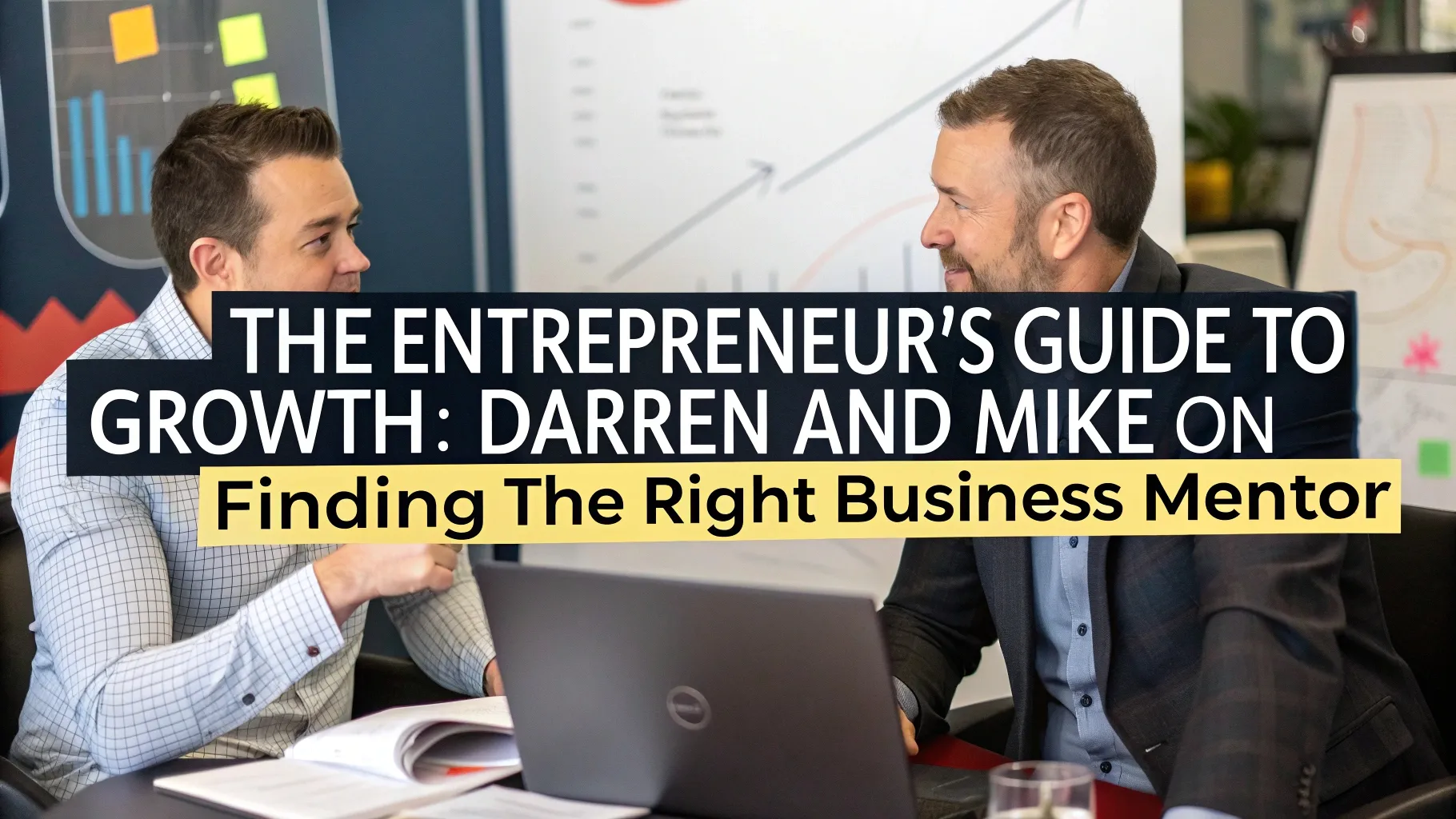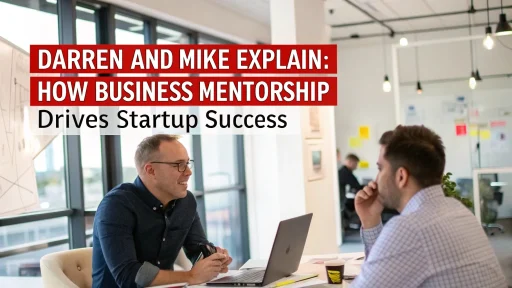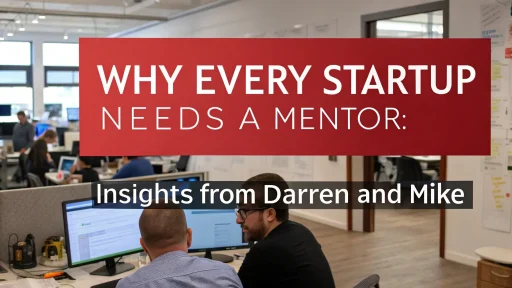Why Business Mentorship Is the Missing Link for Startup Success
A startup is never born from a unique concept or investment round alone. It nearly always accompanies mentorship which helps a founder refine their thinking, make pivotal choices, and provides order during turbulent times. Globally recognized mentors Darren and Mike have over the years, provided guidance to entrepreneurs helping them scale their businesses through insights, frameworks, and a sense of accountability.
Their mentorship philosophy—which is based on real-world experience rather than academic theory—focuses on macro-strategic development and has proven instrumental in fostering exponential growth for solopreneurs, manufacturing startups, and digital entrepreneurs.
The primary focus of this article is the profound realm of mentorship and why it’s critical for industrial and manufacturing startups in India employing the foundational principles set by Mike and Darren. New sectors emerge as a result of the Make in India initiative along with the Production Linked Incentives (PLI). Effective mentorship accelerates optimal decision-making, minimizes costly errors, and enables the construction of globally scalable businesses.
Why Startups Need Mentors More Than Funding in the Initial Stages
Although funding is often considered a priority, mentorship is a startup’s actual asset in the crucial early growth phases. New founders usually have a strong vision or a technical concept, but they often lack the strategic know-how and operational experience to tackle:
- Product-market fit
- Team building
- Compliance
- Market entry
Guiding them is where mentors like Darren and Mike come into play. With decades of entrepreneurial experience, they do not just provide counsel. Rather, they work alongside entrepreneurs and help them develop actionable plans to achieve measurable traction.
In a highly regulated sector like Indian manufacturing, where startups grapple with multiple layers of regulatory hurdles, supply chain problems, and inefficient capital, proper mentorship becomes imperative. Many manufacturing startups waste a lot of time and money figuring things out without a clear roadmap when a faster, guided approach could enable them to grow in just a few months.
Darren and Mike emphasize three core ideas:
- Founders lack awareness about gaps in their knowledge and experience
- Accountability matters more than ability
- Every founder requires their own version of a personal operating system
This shift to a mentorship-first approach is changing not only how entrepreneurs launch businesses but how they sustain and scale them.
Related: Darren and Mike Explain: How Business Mentorship Drives Startup Success
What Makes Darren and Mike’s Mentorship Model Stand Out
What sets Darren and Mike apart is that their mentoring system is a focus on process, not on personality. Instead of vague motivational content, they provide:
- Structured growth systems
- Online tools and frameworks for strategy execution
- Customized mentorship for different sectors and business models
Above all, their mentorship program—which has a global community of entrepreneurs—integrates mindset training with execution playbooks. Most importantly, they help founders deeply internalize this one principle:
A business does not grow until the founder does.
This resonates strongly with the sociocultural context of India’s industrial entrepreneur ecosystem, which makes traditional consulting obsolete for many startup founders who are short on capital or lacked domain expertise in manufacturing.
Through a blend of digital mentoring, recorded modules, and individual strategy sessions, Darren and Mike assist Indian entrepreneurs in closing the gap between ambition and implementation—and do not require them to reinvent the wheel.
The Indian Industrial Landscape: Where Mentorship Is Absolutely Critical
We are now at a defining moment in India’s industrial progress. It is entrepreneurial’s time to shine due to government initiatives such as Make in India, PLI, and Startup India, focusing on:
- Electronics plus components assembly
- Specialty chemicals and solvents
- Agro-processing plus food technology
- Green hydrogen and circular economy ventures
- Contract manufacturing in pharmaceuticals and textiles
Nonetheless, considering Founders need to harness complex engineering principles to navigate through these sectors is naive. A standard industrial entrepreneur must learn:
- Compliance and feasibility planning
- Supply chain partnership and vendor relations
- Talent acquisition and skilling
- Automated digital processes and operations
- Trade strategy and export documents
Founders who undertake such complex tasks without proper mentorship increase their chances of making costly blunders and missing crucial market opportunities.
Learning through mentorship, especially in the form facilitated by Darren and Mike, can significantly shorten this learning curve. As they put it:
Entrepreneurs will only fixate on the right levers of growth from Day One.
Darren and Mike’s Mentorship Philosophy: The Five Core Elements
Darren and Mike’s philosophy is built around five key pillars. These are not theoretical ideas—they’ve been tested and proven across multiple sectors: manufacturing, retail, logistics, and digital startups.
1. Define Over Disarray
All entrepreneurs start with energy but eventually get lost in the details. Following the principles taught by Darren and Mike, one should start with a one-page clarity plan. This succinct plan details aspects like the value propositions, target audience, and predetermined KPIs for measuring success. This clarity plan is almost like a North Star guiding the entrepreneurs, especially during the initial phases of an industrial project.
2. Systems Over Hustle
Rather than relying solely on the efforts of the founder, businesses should focus on systems that can be repeated. They have also highlighted how sales, operations, marketing, and compliance should not operate as silos but instead work with standardized processes, focusing cross-functionally towards a common goal.
3. Action Over Focus
Many founders focus too deeply on planning out every last detail. To combat this, Darren and Mike emphasize launching products as quickly as possible for real-world feedback. Startups, in midlife crises looking for “perfect” structure, should keep in mind the saying:
“Imperfect action beats perfect planning.”
4. Collaboration Over Isolation
Isolation is an issue that most founders face, especially when they are kept stuck with their own problems. With the help of weekly scheduled calls, community forums, and mentor check-ins organized by Darren and Mike, comes the accountability system needed to drive forward momentum. First-generation entrepreneurs who do not have a support network find this method extremely beneficial.
5. Prioritize Growth Over Perfection
Their mentorship encourages founders to scale what works instead of perfecting what doesn’t. Be it a specific customer segment or a high-performing product line, they help entrepreneurs focus on strengths rather than spreading thin.
Related: 10 Most Successful Startup Ideas
How Indian Startups Can Break Sector Barriers With Mentorship
Take this relatable scenario: a founder aims to establish a small-scale unit that produces industrial solvents for pharmaceuticals and paints. This startup may face issues like:
- Regulatory complexity related to hazardous materials
- Sourcing raw chemicals in bulk
- Setting up compliant manufacturing processes
- B2B distribution and order fulfillment hurdles
With a mentor’s help, this founder could:
- Get guidance on vendor onboarding
- Identify batch production bottlenecks using process mapping
- Learn presentation techniques for feasibility studies for banks or investors
- Review case studies of similar setups from other regions
This kind of tailored mentorship helps transform operational fog into strategic clarity.
Here’s another example of a new business owner starting into the EV (electric vehicle) charger parts construction. The modules that Darren and Mike created digitally help the founder understand:
- How to establish product value
- How to close deals with OEMs and Tier-1 suppliers
- What key performance indicators to track for initial tests
- How to set a B2B pricing model
With a well-defined plan and guidance from seasoned mentors, the startup is able to build market credibility more rapidly and sidestep expensive missteps.
Example of a Manufacturing Process: Electronics Sub-Assembly
Let us look at a specific sub-sector where mentorship impacts tremendously: Electronics sub-assembly, for instance, power banks, PCBs, or IoT devices.
Here is a simplified process:
- Component Sourcing – Obtain resistors, capacitors, ICs, and plastic casings from approved suppliers.
- SMT and Assembly – Chips and components are mounted on the PCBs using Surface Mount Technology.
- Enclosure and Testing – Affix assembled PCBs into enclosures and perform load tests.
- Dialing, Pack Closing, and Sending – Units are finally labeled, barcoded, packed, and sent out for shipment.
In theory, this process seems clear-cut, but in practice, it is more complicated: poor sourcing contracts, inadequate documentation, incorrect testing apparatus, or slow supply chains.
In this example, a founder’s mentor can help guide them to circumvent these compliance issues early on.
NPCS: Your Strategic Partner for Project Feasibility and Growth Planning
Startups require more than mentorship mindset and method; they need technical depth, project guidance, and feasibility validation to turn their concepts into industrial models.
Niir Project Consultancy Services (NPCS) fills this gap and, as a result, is crucial.
NPCS Offers:
- Comprehensive Market Survey and Detailed Techno-Economic Reports
- Detailed steps in the manufacturing processes
- Required raw materials
- Optimal layout of the plant
They assists entrepreneurs in evaluating the potential of emerging new industries or scaling up existing ones.
NPCS verifies technical accuracy and commercial potential for both independent and mentored industrial entrepreneurs.
For more information, check our related videos on this article
Mentorship + NPCS = Strategic Execution
In India’s shifting and sometimes chaotic startup landscape, mentorship has become the hallmark of agile decision-making.
NPCS proves that access to clarity, systems, execution support, and accountability enables founders to optimize their speed, intelligence, and resilience during expansion.
For industrial entrepreneurs, every decision matters greatly. Mistakes can lead to:
- Tons of lost raw material
- Months of regulatory delays
This makes mentorship crucial.
Whether you’re establishing:
- An EV part supply chain
- A small chemicals plant
- Or a food processing unit
A mentor enhances your success with project-focused technical guidance that—combined with NPCS’s support—creates a dual engine driving your growth.
Final Thought: A Mentor Adds Direction to Ambition
A mentor provides clarity in a world full of distractions.
In a market full of risk, a mentor brings invaluable experience.
In an environment with countless unknowns, a mentor brings priceless insight.
Are You Planning to Start Your Own Industrial Business?
NPCS provides:
- Comprehensive feasibility studies
- Raw material sourcing
- Designed plant layouts to prepare you for execution
Moreover, with a mentor like Mike or Darren, you will be able to transform your industrial vision into reality and profits.







